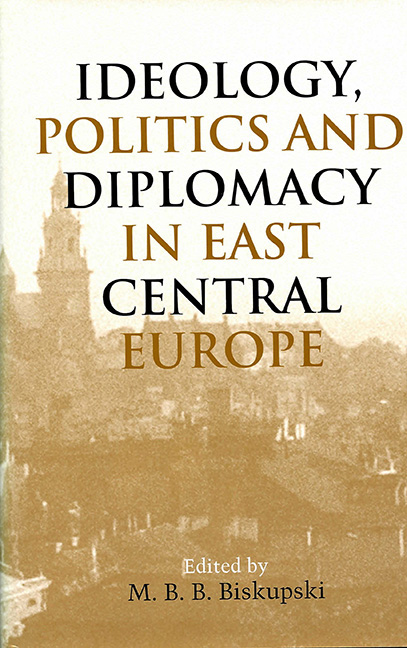Book contents
- Frontmatter
- Contents
- Preface
- Tabula Honoraria
- Piotr Wandycz
- Piotr Wandycz: An Appreciation
- 1 A Comparison of Czech Politics in Bohemia with Czech Politics in Moravia, 1860–1914
- 2 Strategy, Politics, and Suffering: The Wartime Relief of Belgium, Serbia, and Poland, 1914–1918
- 3 “This Troublesome Question”: The United States and the “Polish Pogroms” of 1918–1919
- 4 The Socialist Imprint on International Relations in Interwar Europe
- 5 Hungarian Americans during World War II: Their Role in Defending Hungary's Interests
- 6 The Nazi-Soviet Pact of August 23, 1939: When Did Stalin Decide to Align with Hitler, and Was Poland the Culprit?
- 7 Poland, the GDR, and the “Ulbricht Doctrine”
- Writings of Piotr S. Wandycz
- Contributors
- Index
Piotr Wandycz: An Appreciation
Published online by Cambridge University Press: 11 May 2017
- Frontmatter
- Contents
- Preface
- Tabula Honoraria
- Piotr Wandycz
- Piotr Wandycz: An Appreciation
- 1 A Comparison of Czech Politics in Bohemia with Czech Politics in Moravia, 1860–1914
- 2 Strategy, Politics, and Suffering: The Wartime Relief of Belgium, Serbia, and Poland, 1914–1918
- 3 “This Troublesome Question”: The United States and the “Polish Pogroms” of 1918–1919
- 4 The Socialist Imprint on International Relations in Interwar Europe
- 5 Hungarian Americans during World War II: Their Role in Defending Hungary's Interests
- 6 The Nazi-Soviet Pact of August 23, 1939: When Did Stalin Decide to Align with Hitler, and Was Poland the Culprit?
- 7 Poland, the GDR, and the “Ulbricht Doctrine”
- Writings of Piotr S. Wandycz
- Contributors
- Index
Summary
Piotr Wandycz, in whose honor the essays in this volume have been prepared, encapsulates in his life many of the aspects of Poland's fate, both tragic and fortunate, in the last most violent of centuries. He was born in Kraków in 1923 and went to school in Lwów, which, according to Norman Davies, is the city which “he feels more than anywhere, to have been his Polish home.” His father, Damian Wandycz, was an engineer and a former soldier in the Piłsudski Legions and, together with many others, left Poland with his wife and son during September 1939, moving to Romania and then to France. While in France, Piotr studied at the University of Grenoble. In the late autumn of 1942, the family made its way through Spain to Portugal and from there flew to the United Kingdom. Here the young Wandycz joined the Polish Army in Scotland, where he was later commissioned as a second lieutenant in the First (Armored) Division of General Stanisław Maczak.
After the war, like many other Polish ex-servicemen in the United Kingdom, he was drafted into the Polish Resettlement Corps. His great academic ability was soon recognized and he was accordingly sent to Fitzwilliam College in Cambridge, where in 1948 he took his B.A. in history. He then moved to the London School of Economics and Political Sciences, where he wrote his Ph.D. dissertation under the direction of the redoubtable Professor Charles Manning.
One of Professor Wandycz's most striking characteristics is his ability to combine an internationalist and liberal perspective with an emphatic Polish patriotism. This combination was already evident in his doctoral dissertation. He took as his subject “Liberal Internationalism: The Contribution of British and French Liberal Thought to the Theory of International Relations.” It was a thorough and lucid survey of the development of liberal thought on foreign policy from Bentham and Mill to T. H. Green and L. T. Hobhouse and from Thiers, Lamennais and de Tocqueville to Laboulaye, Prevost-Paradol, Leroy-Beaulieu, Molinari and Revouvier. Among the topics it analyzed were the view of these thinkers on the question of national identity, the principle of nonintervention, peace, international morality and international law. All these topics have been central to Professor Wandycz's scholarly interests, and also reflect some of the preoccupations of Manning. What is striking about the dissertation is its obviously deliberate eschewing of any specifically Polish motifs.
- Type
- Chapter
- Information
- Ideology, Politics, and Diplomacy in East Central Europe , pp. xiii - xxPublisher: Boydell & BrewerPrint publication year: 2003

